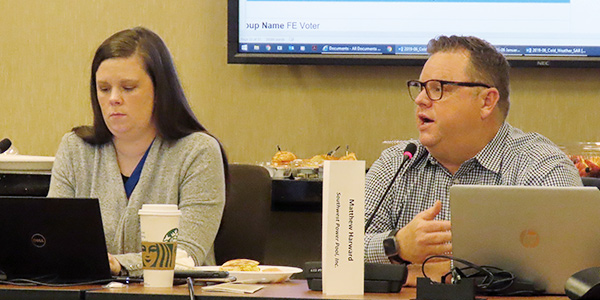By Holden Mann
The team working on NERC’s proposed standard for cold weather preparedness plans to meet again in the next two weeks to finish working through the latest round of comments on its draft standard authorization request (SAR).
Team members had planned to address the comments this week but were unable to finish partly because of scheduling difficulties related to the COVID-19 coronavirus outbreak.
The second round of comments on Project 2019-06 opened in February and closed last week, focusing on changes made to the SAR in response to the first round that closed in November. (See Gen Operators Cool to Winter Preparedness Standard.) In light of the cool reception to the proposal at that time, the team made a number of updates aimed at satisfying the misgivings of industry commenters while still fulfilling its mandate to create an enforceable standard for cold weather preparation. (See Cold Weather SDT Planning February Posting.)
Some of the changes drew widespread appreciation from commenters, but others provoked a more negative reaction. A lengthy comment from Mark Gray of the Edison Electric Institute, which was supported by several other participants, raised a number of potential issues that accounted for most of the drafting team’s time.
Emphasis Shifts to Communication
Gray applauded the SAR for putting greater emphasis than previous drafts on “the need for good communication between balancing authorities, reliability coordinators and generator owners and generator operators” both before and during extreme cold weather events. However, he questioned why the revised SAR included language requiring “communications … of all ambient weather impacts” rather than cold weather impacts only.
In response, NERC Senior Standards Developer Jordan Mallory observed that the expanded language was based on the belief that impacts outside of cold weather events could affect a generating unit’s performance in ways a BA or RC might need to know about. But based on the widespread objection, the team was prepared to drop the language, she said.
“We had a lot of conversations internally about this, and I can say [that] while we still feel all weather needs to be in there, we have heard people speak and we’re at a place where we’re comfortable with communication focusing on cold weather,” Mallory said.
Also at issue was a requirement that utilities report “historical demonstrated performance and limitations during ambient cold weather,” which many respondents complained might provide a misleading impression of a unit’s capabilities. Members explained that this requirement was intended as a supplement to other information, not a replacement.
“We basically landed on demonstrated historical performance as kind of a proxy for the unit’s performance,” said Matt Averett of Southern Co. “[It’s] not [that] the unit will be available above this temperature, [but] below this temperature, its performance is uncertain. … It was kind of a common ground, so to speak, between not having anything at all and falling back on the unit’s design [temperature].”
Regional Split Continues
Establishing an appropriate definition for “cold weather” remained a major point of contention among respondents, with several operators in northern areas continuing to insist that they were capable of handling cold weather preparations on their own. Despite the revisions, these respondents still said the proposed standard could impose a considerable compliance burden on them for no benefit.
As in the previous round of comments, this argument made little headway with the team. But members did promise that future revisions would continue to balance the need for an overarching standard with the requirements of operators in different regions.
“I want to be sure we’re not expecting 10,000 entities to come up with their own definition of cold weather,” said Don Urban of ReliabilityFirst. “I agree it should be the RC and BA. That is done now in our footprint; they define what cold weather is.”
Chair Matthew Harward of SPP said the team would make sure to take the industry’s misgivings into account in the next round of revisions. He also encouraged participants to continue providing feedback, reminding them that FERC was prepared to move forward on the new standard with or without their input.
“FERC has given industry a great opportunity to respond to the FERC cold weather report and propose a solution developed by industry,” Harward said. “I think we can all agree the industry development of a response to the FERC recommendations is more optimal than other options FERC may impose.”




